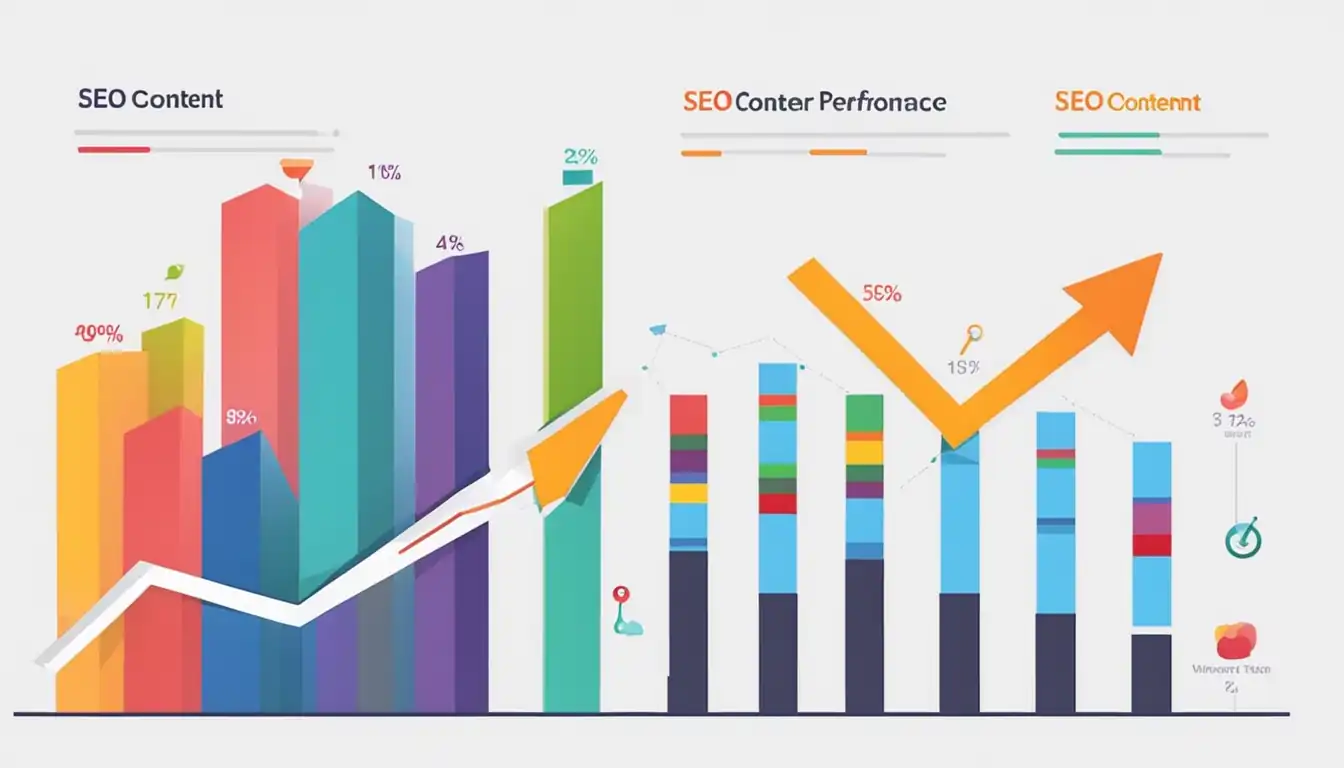Measuring SEO Content Effectiveness

In the world of SEO, creating great content is only half the battle. To truly understand the impact of your efforts, you need to measure the effectiveness of your content. By analyzing key metrics and setting clear goals, you can track your progress, optimize your strategies, and ultimately drive better results. In this post, we'll dive into how to measure the effectiveness of your SEO content and ensure that your efforts are paying off.
Understanding SEO Content Metrics
When it comes to measuring the effectiveness of your SEO content, there are several key metrics that you should pay attention to. These metrics can help you understand how well your content is performing and where there may be room for improvement.
Key Performance Indicators for SEO
Organic Traffic: This metric measures the number of visitors that come to your website through organic search results. An increase in organic traffic indicates that your content is ranking well and attracting more visitors.
Keyword Rankings: Monitoring the rankings of your target keywords is essential for understanding how well your content is optimized for search engines. Tracking keyword positions can help you identify which keywords are driving traffic to your site.
Click-Through Rate (CTR): CTR measures the percentage of people who click on your website link after seeing it in search results. A high CTR indicates that your content is relevant and compelling to users.
Bounce Rate: Bounce rate measures the percentage of visitors who leave your site after viewing only one page. A high bounce rate may indicate that your content is not engaging or relevant to visitors.
Conversion Rate: Conversion rate tracks the percentage of visitors who take a desired action on your website, such as making a purchase or signing up for a newsletter. Monitoring conversion rates can help you understand how effective your content is at driving user actions.
Tools and Platforms for Tracking Success
There are several tools and platforms available to help you track the success of your SEO content efforts. Some popular options include:
Google Analytics: Google Analytics provides detailed insights into website traffic, user behavior, and conversions. It allows you to track key metrics such as organic traffic, keyword rankings, and conversion rates.
SEMrush: SEMrush offers a suite of tools for keyword research, competitor analysis, and tracking SEO performance. It can help you identify opportunities for improvement and monitor the success of your content strategy.
Moz Pro: Moz Pro provides tools for keyword research, rank tracking, and site audits to help improve your SEO performance. It also offers insights into competitor strategies and industry trends.
By utilizing these key performance indicators and leveraging tools like Google Analytics, SEMrush, and Moz Pro, you can effectively measure the effectiveness of your SEO content strategy and make data-driven decisions to optimize future efforts.
Setting Goals and Benchmarks

Defining Clear Objectives for Your Content
When measuring the effectiveness of your SEO content, it is crucial to start by defining clear objectives for your content. These objectives should align with your overall business goals and target audience. Whether your goal is to increase website traffic, improve search engine rankings, or drive conversions, having a clear objective will guide the creation and optimization of your content.
Establishing Realistic Benchmarks
Once you have defined your objectives, the next step is to establish realistic benchmarks to measure the success of your SEO content. These benchmarks can include key performance indicators (KPIs) such as organic traffic growth, keyword rankings, click-through rates, and conversion rates. By setting specific targets for these metrics, you can track the performance of your content over time and make informed decisions about future optimizations.
Analyzing Traffic Sources and Behaviors
Breaking Down Traffic Sources
When measuring the effectiveness of SEO content, it is crucial to analyze the sources of traffic to your website. By understanding where your visitors are coming from, you can better tailor your content to target those specific channels. Some common traffic sources to consider include:
- Organic Search: Visitors who find your website through search engine results.
- Direct Traffic: Visitors who directly type in your website's URL or access it through bookmarks.
- Referral Traffic: Visitors who come to your website from external links on other websites.
- Social Media Traffic: Visitors who discover your content through social media platforms.
By breaking down these traffic sources, you can identify which channels are driving the most engagement and conversions for your SEO content.
User Engagement Metrics That Matter
In addition to analyzing traffic sources, it is essential to measure user engagement metrics that indicate how effectively your SEO content is resonating with your audience. Some key user engagement metrics to consider include:
- Bounce Rate: The percentage of visitors who navigate away from your website after viewing only one page.
- Time on Page: The average amount of time visitors spend on a specific page.
- Pages per Session: The average number of pages a visitor views during a single session on your website.
- Conversion Rate: The percentage of visitors who complete a desired action, such as making a purchase or signing up for a newsletter.
By tracking these user engagement metrics, you can gain insights into how engaging and valuable your SEO content is to visitors, allowing you to make data-driven decisions for future content optimization strategies.
The Role of Conversion in Measuring Effectiveness
When measuring the effectiveness of SEO content, one crucial aspect to consider is conversion. Conversions refer to the desired actions that visitors take on a website, such as making a purchase, signing up for a newsletter, or filling out a contact form. By tracking conversions, businesses can determine how well their content is performing in terms of driving valuable actions.
From Visitor to Customer: Tracking Conversion Paths
To measure the effectiveness of SEO content in terms of conversions, it is essential to track the conversion paths that visitors take on a website. This involves analyzing the journey that users go through from their initial interaction with the content to completing a desired action. By understanding these conversion paths, businesses can identify any bottlenecks or areas for improvement in their content strategy.
Optimizing Content for Higher Conversion Rates
Optimizing content for higher conversion rates involves creating compelling and relevant material that encourages visitors to take action. This can include using persuasive language, clear calls-to-action, and engaging visuals to guide users towards conversion points. Additionally, conducting A/B testing and analyzing user behavior can help businesses refine their content strategy for maximum effectiveness in driving conversions.
By focusing on conversion metrics and optimizing content accordingly, businesses can measure the success of their SEO efforts and make data-driven decisions to improve performance over time.
Long-Term Impact and ROI Measurement

Evaluating SEO's Contribution to Business Growth
In order to measure the effectiveness of SEO content, it is essential to evaluate its long-term impact on business growth. This involves looking beyond immediate results and assessing how SEO efforts contribute to the overall success of the business.
One way to evaluate SEO's contribution to business growth is by tracking key performance indicators (KPIs) such as organic traffic, conversion rates, and revenue generated from organic search. By analyzing these metrics over time, businesses can determine the impact of their SEO content on driving traffic and conversions.
Techniques for Assessing Long-Term ROI
Conversion Tracking: Implementing conversion tracking tools such as Google Analytics can help businesses measure the ROI of their SEO content by tracking conversions from organic search traffic. This allows businesses to see which keywords and content are driving the most valuable conversions.
Customer Lifetime Value: Calculating the customer lifetime value (CLV) of users acquired through organic search can provide insights into the long-term ROI of SEO content. By understanding how much revenue each customer generates over time, businesses can assess the value of their SEO efforts.
Attribution Modeling: Utilizing attribution modeling techniques can help businesses understand how different touchpoints in the customer journey contribute to conversions. By attributing conversions back to specific pieces of SEO content, businesses can measure the effectiveness of their content in driving conversions.
Competitive Analysis: Conducting competitive analysis can also help businesses assess the effectiveness of their SEO content compared to competitors. By analyzing competitors' keyword rankings, traffic sources, and conversion rates, businesses can identify areas for improvement and optimize their own content strategy for better results.
In conclusion, measuring the effectiveness of SEO content requires a comprehensive approach that looks beyond short-term metrics and evaluates its long-term impact on business growth. By utilizing techniques such as conversion tracking, customer lifetime value analysis, attribution modeling, and competitive analysis, businesses can gain valuable insights into the ROI of their SEO efforts.
Understanding SEO Content Metrics
 When it comes to measuring the effectiveness of your SEO content, key performance indicators (KPIs) are essential. These metrics give you insight into how well your content is performing and where improvements can be made. From organic traffic to keyword rankings, understanding these KPIs is crucial for success. Additionally, utilizing tools and platforms such as Google Analytics or SEMrush can help you track success more efficiently.
When it comes to measuring the effectiveness of your SEO content, key performance indicators (KPIs) are essential. These metrics give you insight into how well your content is performing and where improvements can be made. From organic traffic to keyword rankings, understanding these KPIs is crucial for success. Additionally, utilizing tools and platforms such as Google Analytics or SEMrush can help you track success more efficiently.